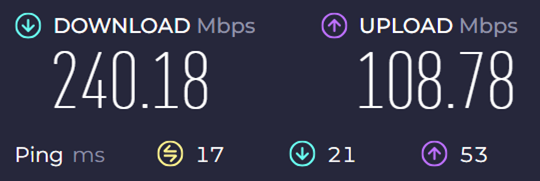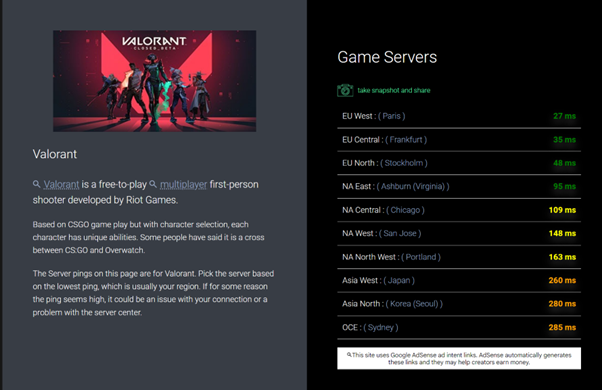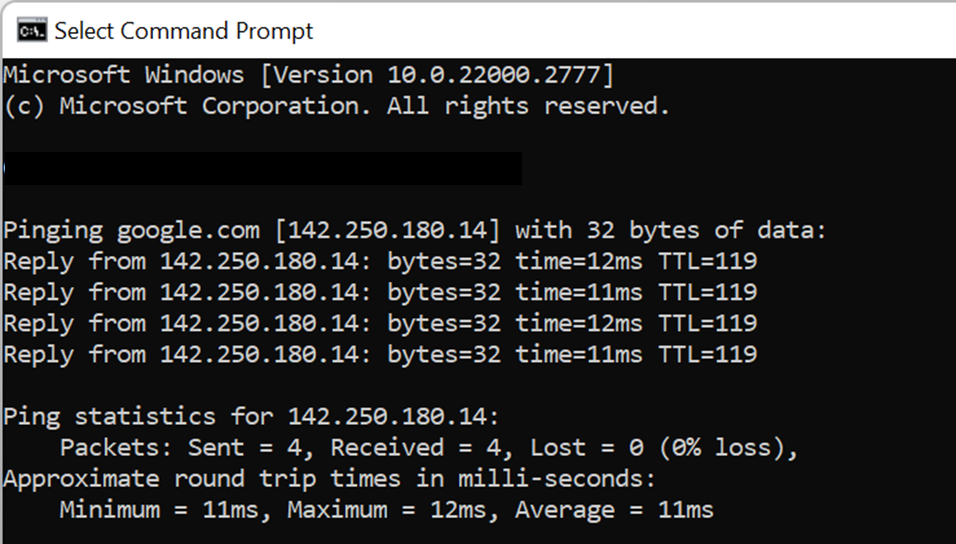What is a good internet speed for gaming?
This form is protected by reCAPTCHA - the Google Privacy Policy and Terms of Service apply.
Don't have an account?
Creating an account has many benefits: check out faster, keep more than one address, track orders and more.
Why is internet speed important for gaming?
If you’re a fan of playing games online, there’s a good chance you already know the importance of good internet speed. It can affect how quickly you can download the latest games to your PC, how smooth your online gameplay is, and even affects that all important responsiveness that can be the difference between making the winning shot or letting your team down!
So, if you want your online gameplay to match your skill level, you need internet that is fast enough to keep up. But when you start looking into internet speed, you might come across things such as, ‘download vs upload speed’ or the terms ‘ping’ or ‘latency’. What do they mean? And how do they affect your gaming? Don’t worry, the team at Fierce are here to help!
What is Latency in gaming?
Latency, also known as ‘ping rate’, is the measure of time it takes for data to travel to a destination and back, measured in milliseconds. In gaming terms, the data might be you pressing a button on your keyboard and the latency would be how long it takes for that keyboard press to translate to an action in-game. Gamers use ping and latency interchangeably, but ‘ping’ is the action of sending data to a receiver, so you might ‘ping a server’.
Obviously then, for the best gaming experience, you want the latency to be as low as possible. High latency causes delays in your gameplay, and if you’ve ever experienced severe lag in-game, you’ll know just how frustrating this can be, both for yourself and the people you’re playing with.
We’ll come to download and upload speeds in the next section, but the requirements for most modern games, as far as these are concerned, are fairly minimal, meaning latency, or ping rate, is by far the most important thing to consider when looking at internet speeds. A latency of 100ms or lower is what you’ll want to aim for, for fast, consistent, online gaming.
Download speed vs Upload speed
When you are gaming online, your PC is constantly sending and receiving data to and from the games servers. How fast it sends that data to the server is your ‘upload’ speed, and how quickly it can get that data is your ‘download’ speed, measured in ‘megabits per second’ (Mbps). When you stream your gameplay, you’re having to send a lot of data at rapid speeds, so your upload speed needs to be high. If you’re watching something on a streaming service, your system has to receive a consistent stream of data from that service and so your download speed needs to be high.
For gaming online, you are mostly sending small amounts of data. A lot of the game processing, even when playing online, is handled by your CPU. Your systems processor will take care of calculating game physics and displaying the action on-screen, so the amount of data being uploaded and downloaded is usually pretty minimal.
The data that is being transferred includes things like;
- Where characters are, in game, in relation to everything else
- Current world state
- Control inputs
- Chats and communication
- Any in-game notifications
So there is a requirement to have a good download/upload speed, but what you need to be able to play online isn’t huge. Most console manufacturers would recommend 1-3MBps download speed and 0.5-2Mbps upload speed.
For the best online experience, we would recommend going much higher. 25Mbps is probably the minimum download speed you’ll need if no-one else is using the internet or connecting devices and you’re playing a less demanding game at off-peak times.
If you’ve heard people referring to ‘bandwidth’ when talking about internet speed, this is simply the maximum amount of data you can download and upload at any given time.
Download speed vs ping
A lot of gamers, when thinking about their internet requirements, think about how quickly they can download the latest games. No-one wants to be stuck waiting for hours just to play! This is why download speed is often touted as the most important aspect of internet speed, after all, almost anything you do online is affected by your download speed. If you’re browsing the internet or watching films or tv series online, then a fast download speed is absolutely important.
But ping is going to have a much bigger effect on your gaming. A high latency causes delays between what is going on in-game vs. what is happening on your screen. In fighting games or first-person shooters, your opponents inputs can actually register before yours if they have a low latency and you have high latency. This can be incredibly frustrating and have a huge impact on your online experience. If you’re predominantly using your PC to game online, then you’re going to want as little ping as possible.
<H3> How to test internet speed</H3>
The easiest way to test your bandwidth internet speed is with an online speed test such as ‘Speedtest’ by Ookla, ‘Fast.com’ or ‘Highspeedinternet.com’. There are plenty of others, but they will all run a short test and then give you an overview of your download speeds and upload speeds.

When it comes to measuring ping, you should be aware that ping is not a single, universal score. Response times will vary depending on the server you’re trying to reach, so you need to ping a specific location to get your response time for that specific location. What this means is, you will get different response times with different games as they all use different servers.
Game Server Ping lets you test against a given server for the most popular games, giving you an indication of the performance you can expect in that game. As you can see below, I can expect pretty low latency if I’m playing Valorant on European servers.

You can also manually ping a server, if you know the IP address (or domain name), on Windows. Simply;
- Go to the taskbar and type ‘cmd’.
- When the command prompt window opens, type ‘ping’ followed by the IP address or domain name.
- In the below example, we’ve entered, ‘ping google.com’ and the command prompt has returned a list of latency data for various google servers:

For our purposes, the important information here is the time (12ms), which is how quickly we get a response from the pinged server.
Recommended ping ranges
Less than 20ms: Super-fast! You aren’t going to have any issues with lag. If you suck, you only have yourself to blame.
20ms-50ms: A fairly standard range for gaming, you shouldn’t have any issues here, although if you’re playing against serious gamers, they will be aiming for 20ms or less.
50ms-100ms: You may start to experience some lag within this range and speed advantage of other players may become more noticeable.
100ms-300ms: For every 50ms increase in latency, the effect becomes more noticeable. Within this range, you’re likely going to lag and you might end up being the player that gets kicked from the server!
300ms or more: Unfortunately, this just won’t work for smooth, consistent online gaming.
How to reduce latency
Latency can be affected by your physical distance from the server or the type of connection you are using for your internet.
As you saw from the gameserverping.com screenshot above, many online multiplayer games will utilise multiple, regional servers, and the further you are from the server, the greater the latency you will experience.
When you send data to the server, that data has to travel through a route of ‘gateway nodes’ (also called ‘hops’). Each hop adds a processing delay, so the further you are from the remote server, the more hops your data takes which increases latency.
This can be further compounded by traffic congestion, which is kind of like an internet traffic jam, with too many requests going to the server all at once, causing slower response times.
Obviously, physically moving closer to the server is less than practical, but you can usually check which server you’re connected to in a given game. You should automatically connect to the nearest server, but if you’re experiencing problems, it’s worth checking which server you’re connected to. If you live in the UK but you’re connecting to a server in Japan or Australia, you aren’t going to have the best experience!
Here are some tips to minimise latency:
USE A WIRED CONNECTION IF YOU CAN
Wi-Fi is great but when it comes to gaming, using Wi-Fi adds an extra layer of data translation so there is always going to be a slight delay compared to a wired connection.
More than that, you’re at greater risk of intermittent dropping out and slower speeds than if you were using a wired connection. When you start adding in Wi-Fi interference, speed fluctuations, network congestion or even just the signal struggles when you sit in a different room from your router, Wi-Fi can just cause a whole host of problems for your online gaming. We would always recommend using an ethernet cable to connect directly to your router.
POWER CYCLE
This sounds a lot cooler than it is, because it’s essentially just turning your modem off and back on again. This can help if you’re experiencing a small amount of latency. To power cycle, simply unplug your modem, wait a few seconds, and then plug it back in.
TURN OFF OTHER DEVICES
If someone in your household is streaming the latest series of Bridgerton in glorious 4K, whilst you’re waiting in the lobby for your next match, you march into that room and you turn off their device!
Not seriously, but other devices connected to your home network can all cause a congestion that will slow down your gaming session, so if you do have smart devices that you can switch off, or if you can pause any downloads, that should all help.
PORT FORWARD
Typically, by default, your Wi-Fi router will assign dynamic IP addresses to your devices and that address will change periodically. You can, however, change your settings so that you use a static IP address. This tells your router to forward data to the address you specify through a specific port. When it comes to gaming, game servers will often require a static IP address because they provide a more stable connection and reduce lag, giving you a more reliable gaming experience.
AVOID PLAYING AT PEAK TIMES
This may not always be an option but when lots of people are accessing the internet or lots of devices are connected to your router, it can cause a slow-down.
Best internet speed for gaming
While the ‘best’ internet speed for you will depend on a number of factors (such as what games you are playing, how many devices you are connecting, and if you have additional requirements such as streaming), if you’re serious about getting the best from your online gaming experience, we would recommend going with an internet speed of at least 50Mbps, ideally higher, and the lowest latency you can find (ideally less than 50ms). We would also recommend choosing a fibre connection if you have the option as this provides the best speeds and the lowest latency.
